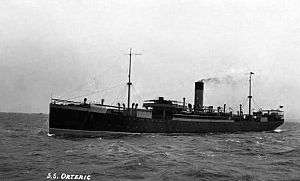SS Orteric (1910)
 Photo of SS Orteric c.1911-1913 from an old ship postcard. | |
| History | |
|---|---|
| Name: | SS Orteric |
| Owner: | Andrew Weir & Co., Glasgow |
| Operator: | Bank Line, Inver Transport & Trading |
| Builder: |
|
| Yard number: | 607 |
| Launched: | 19 December 1910 |
| In service: | 1910-1915 |
| Fate: |
|
| Notes: | Brought Spanish & Portuguese immigrants on 13 April 1911 to Hawaii |
| General characteristics | |
| Class and type: | cargo steamship |
| Tonnage: | 6,535 gross tons |
| Length: | 460 feet (140.2 m) |
| Beam: | 57 feet (17.4 m) |
| Propulsion: |
|
| Speed: | 13 knots |
SS Orteric is a Clyde-built British cargo ship that on 13 April 1911 brought 960 Spanish and 565 Portuguese immigrants to Hawaii to work on the sugar plantations. The ship was subsequently torpedoed and sunk in the middle of the Mediterranean Sea by a German U-boat during the First World War.
Description
The SS Orteric was built by Russell & Company of Port Glasgow in the Firth of Clyde shipyards as a 6,535 gross tons cargo ship that was 460 feet (140.2 m) long with a beam of 57 feet (17.4 m), and a triple expansion engine built by Rankin and Blackmore of Greenock that gave her a cruising speed of 13 knots. The ship was launched on 19 December 1910 by owner Andrew Weir of Glasgow for cargo and passenger service in his various transport companies, including the Bank Line, Inver Transport & Trading Co.[1][2]
Immigrant ship
The Orteric is historically significant because on one of her early voyages in 1911 she brought 960 Spanish and 565 Portuguese immigrants to Hawaii to work as contract labor in the sugar cane plantations. This made her the last ship to participate in the Portuguese immigration to Hawaii of 1878-1911, and the second ship to participate in the Spanish immigration that followed. The Spanish immigrants, who were mostly from the area of Seville, boarded the ship at Gibraltar, and the Portuguese boarded at Oporto and Lisbon, Portugal. They left Gibraltar on 24 February 1911 and arrived on 12 April 1911 in Hawaii after 48 days at sea. Hawaiian newspapers reported that the two groups argued and fought with each other during the long voyage, "so much so that they had to be separated. The women . . . went as far as hair pulling." There was also an outbreak of measles during the voyage that resulted in 58 deaths, most of them children.[3][4]
Sinking during World War I
Orteric made several voyages across the Atlantic until she was torpedoed and sunk by German U-boat SM U-39 on 9 December 1915 in the middle of the Mediterranean Sea about 140 miles southeast of the island of Gavdos.[2][5] The ship was hauling 10,000 tons of sodium nitrate from Antofagasta, Chile, to Alexandria, Egypt when the submarine was spotted. The captain of Orteric tried evasive maneuvers, but the U-boat was commanded by Captain Walter Forstmann, one of the most skillful and deadliest U-boat commanders of the war. When it became evident that escape was impossible, a white flag of surrender was hoisted over Orteric, but the U-boat fired torpedoes anyway, sinking the ship, and killing two Chinese sailors on board.[6] Captain Forstmann subsequently detained the lifeboat with the captain of Orteric long enough to force the latter to sign a German document, then set him adrift. A few hours later three lifeboats with the survivors of Orteric were rescued by a British hospital ship.[7]
See also
- Portuguese immigration to Hawaii
- Spanish immigration to Hawaii
- German U-Boat SM U-39
- List of shipwrecks in December 1915
References
- ↑ "SS Orteric". Clyde-built Ship Database. Retrieved 9 November 2013.
- 1 2 "SS Orteric (I) (+1915)". The Wreck Site (online database). Retrieved 9 November 2013.
- ↑ "Orteric". Pacific Commercial Advertiser (newspaper). Honolulu Hawaii. April 14, 1911. Retrieved 5 November 2013. Extracted from State of Hawaii Library microfilm, State of Hawaii Archives.
- ↑ "Orteric arrives with many laborers". The Hawaiian Gazette. Honolulu, Hawaii. April 14, 1911. pp. 1, 8.
- ↑ Helgason, Guðmundur. "Ships hit during WWI: Orteric". German and Austrian U-boats of World War I - Kaiserliche Marine - Uboat.net. Retrieved 9 November 2013.
- ↑ "Torpedoed liner Orteric - typical submarine atrocity". Evening Post. CXI (20). New Zealand. January 25, 1916. p. 7. Retrieved 10 November 2013.
- ↑ "Forced on U-boat to sign a paper". The New York Times. February 20, 1916. Retrieved 9 November 2013.